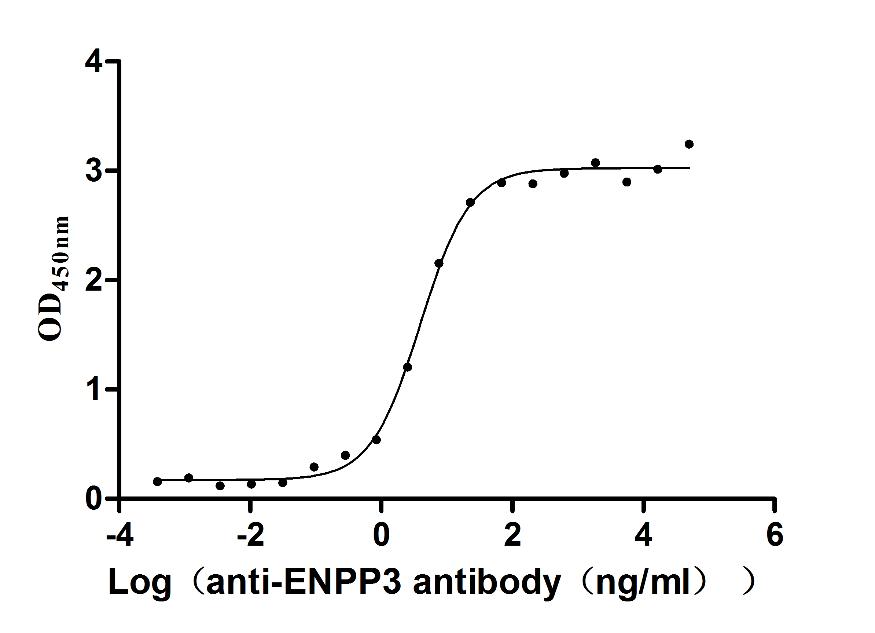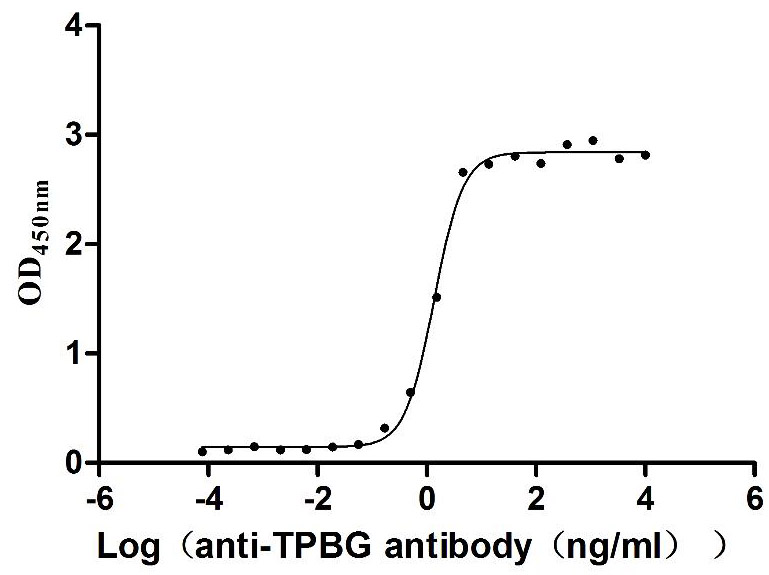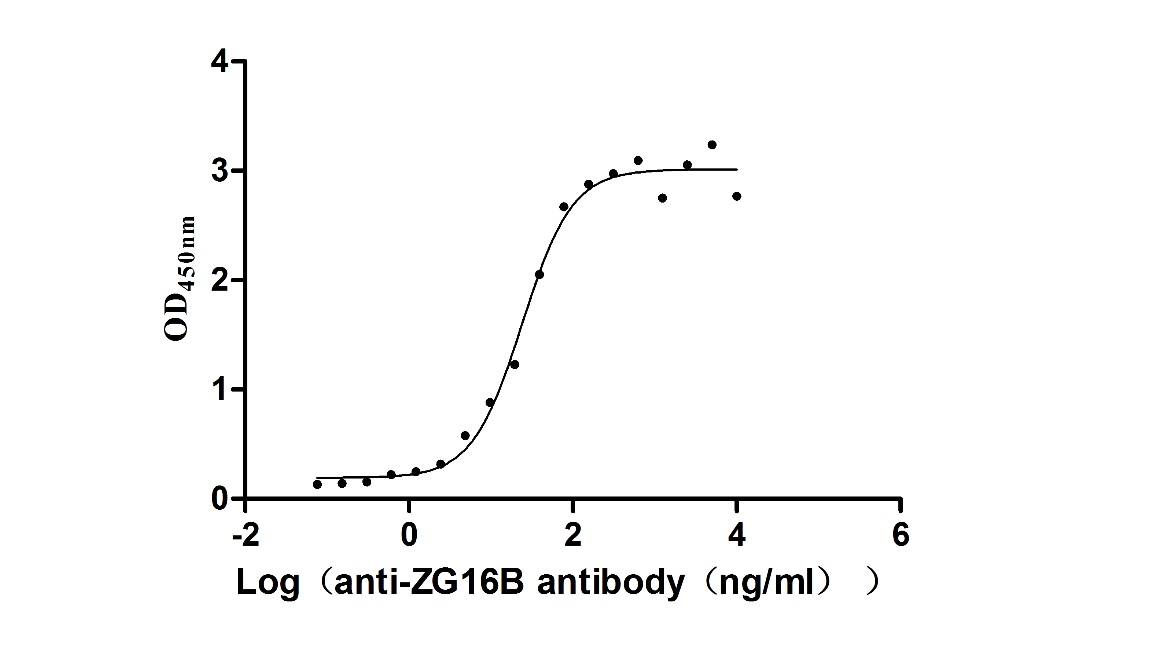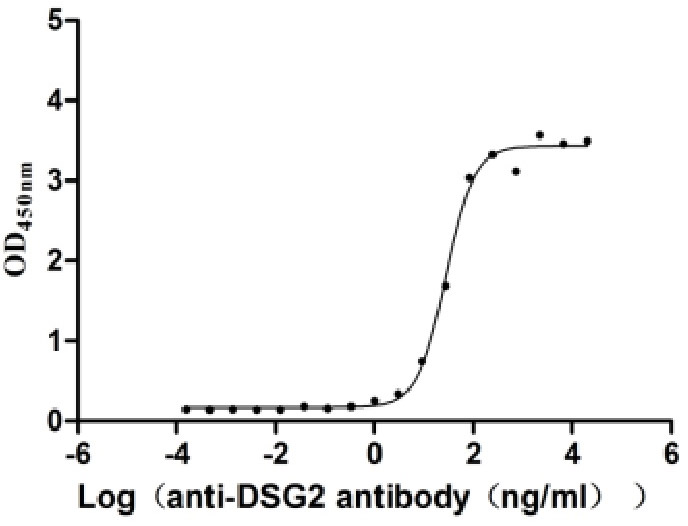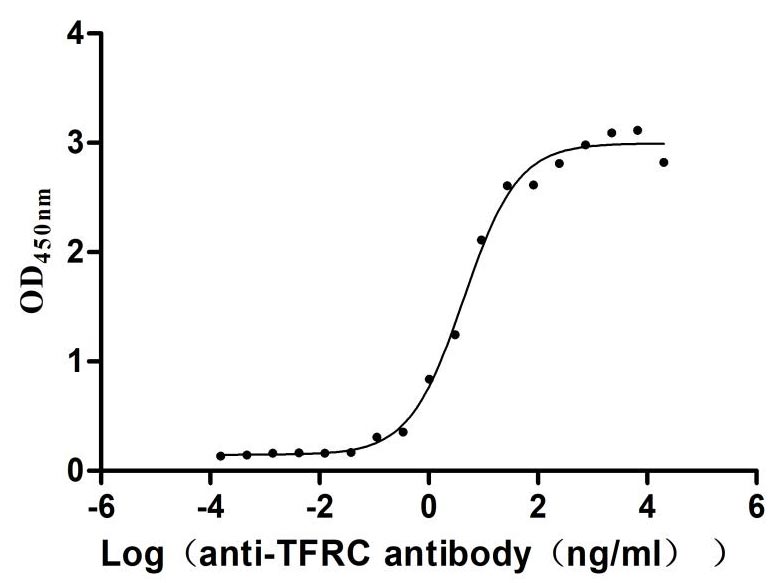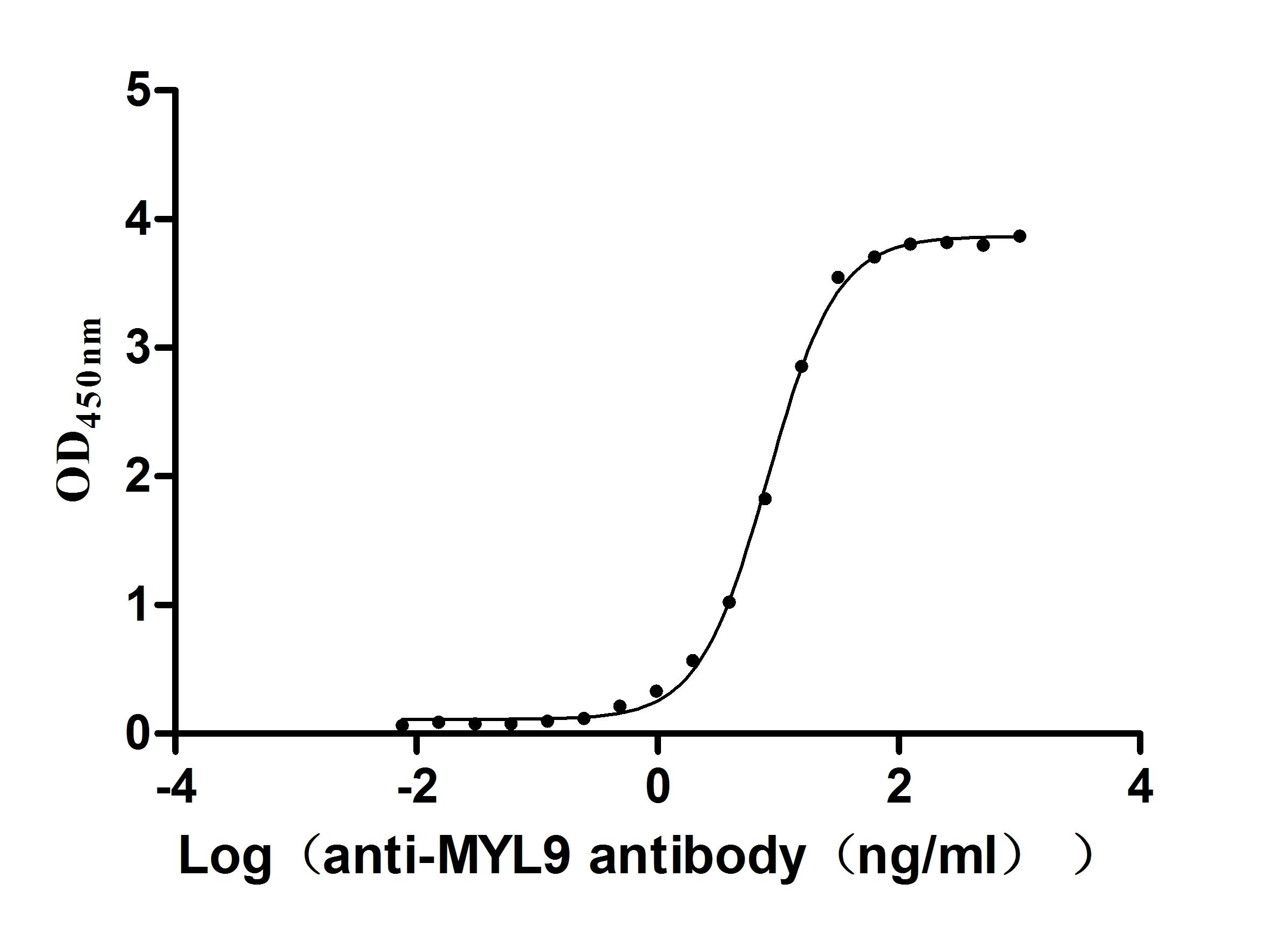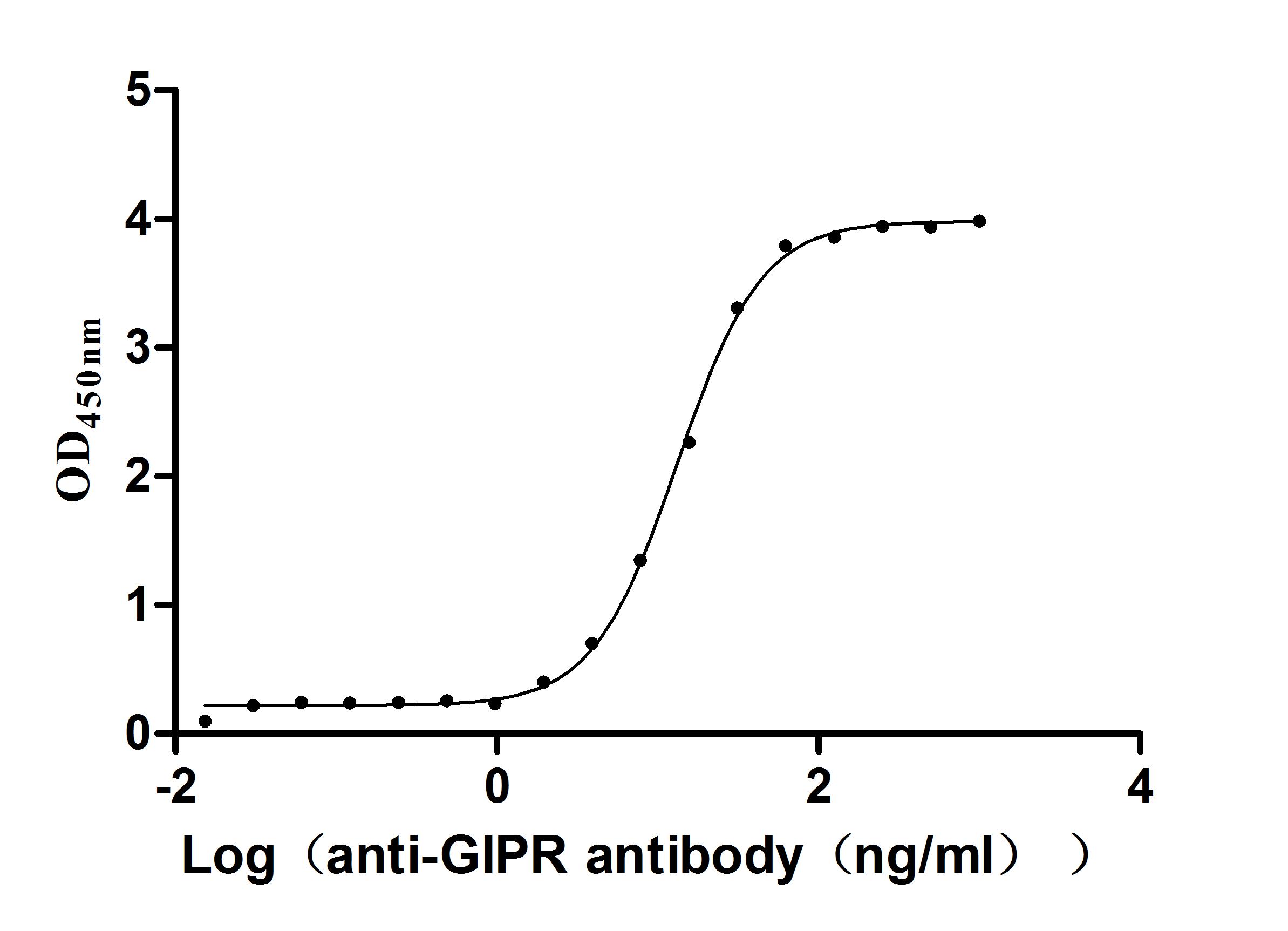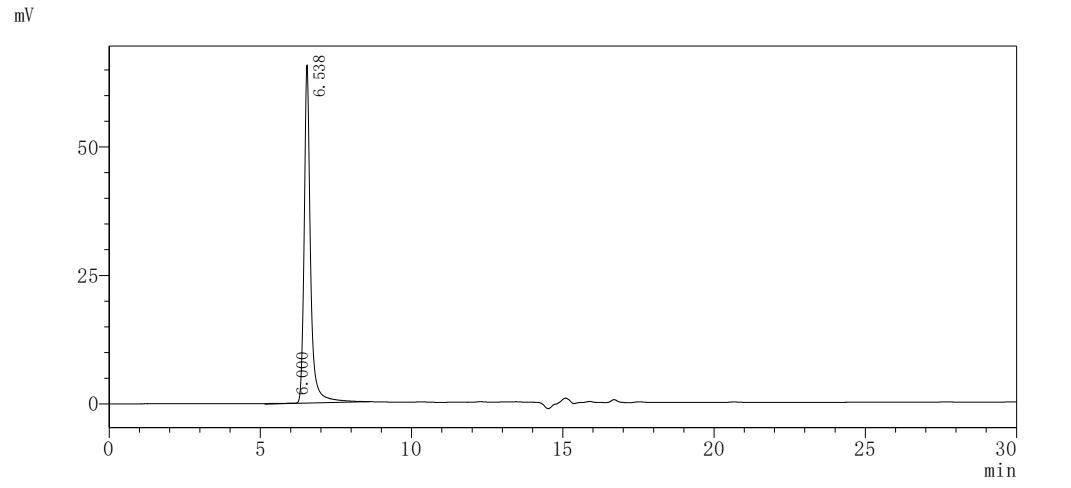Recombinant Human Neuronal acetylcholine receptor subunit alpha-5 (CHRNA5)
-
货号:CSB-CF005391HU
-
规格:
-
来源:in vitro E.coli expression system
-
其他:
产品详情
-
基因名:CHRNA5
-
Uniprot No.:
-
别名:CHRNA5; NACHRA5; Neuronal acetylcholine receptor subunit alpha-5
-
种属:Homo sapiens (Human)
-
蛋白长度:Full Length of Mature Protein
-
表达区域:23-468
-
氨基酸序列RCGLAGAAGGAQRGLSEPSSIAKHEDSLLKDLFQDYERWVRPVEHLNDKIKIKFGLAISQ LVDVDEKNQLMTTNVWLKQEWIDVKLRWNPDDYGGIKVIRVPSDSVWTPDIVLFDNADGR FEGTSTKTVIRYNGTVTWTPPANYKSSCTIDVTFFPFDLQNCSMKFGSWTYDGSQVDIIL EDQDVDKRDFFDNGEWEIVSATGSKGNRTDSCCWYPYVTYSFVIKRLPLFYTLFLIIPCI GLSFLTVLVFYLPSNEGEKICLCTSVLVSLTVFLLVIEEIIPSSSKVIPLIGEYLVFTMI FVTLSIMVTVFAINIHHRSSSTHNAMAPLVRKIFLHTLPKLLCMRSHVDRYFTQKEETES GSGPKSSRNTLEAALDSIRYITRHIMKENDVREVVEDWKFIAQVLDRMFLWTFLFVSIVG SLGLFVPVIYKWANILIPVHIGNANK
Note: The complete sequence including tag sequence, target protein sequence and linker sequence could be provided upon request. -
蛋白标签:N-terminal 10xHis-tagged
-
产品提供形式:Liquid or Lyophilized powder
Note: We will preferentially ship the format that we have in stock, however, if you have any special requirement for the format, please remark your requirement when placing the order, we will prepare according to your demand. -
缓冲液:Lyophilized from Tris/PBS-based buffer, 6% Trehalose, pH 8.0
-
储存条件:Store at -20°C/-80°C upon receipt, aliquoting is necessary for mutiple use. Avoid repeated freeze-thaw cycles.
-
保质期:The shelf life is related to many factors, storage state, buffer ingredients, storage temperature and the stability of the protein itself.
Generally, the shelf life of liquid form is 6 months at -20°C/-80°C. The shelf life of lyophilized form is 12 months at -20°C/-80°C. -
货期:Basically, we can dispatch the products out in 1-3 working days after receiving your orders. Delivery time may differ from different purchasing way or location, please kindly consult your local distributors for specific delivery time.Note: All of our proteins are default shipped with normal blue ice packs, if you request to ship with dry ice, please communicate with us in advance and extra fees will be charged.
-
注意事项:Repeated freezing and thawing is not recommended. Store working aliquots at 4°C for up to one week.
-
Datasheet & COA:Please contact us to get it.
相关产品
靶点详情
-
功能:After binding acetylcholine, the AChR responds by an extensive change in conformation that affects all subunits and leads to opening of an ion-conducting channel across the plasma membrane.
-
基因功能参考文献:
- Glutamatergic N398 neurons responded to lower nicotine doses (0.1 muM) with greater frequency and amplitude but they also exhibited rapid desensitization, consistent with previous analyses of N398-associated nicotinic receptor function PMID: 27698409
- Increased habenula-striatum functional connectivity may be modulated by the nicotinic receptor variant rs16969968 and may lead to increased Opioid use. PMID: 28857330
- Our present study suggested that rs667282 in CHRNA5-A3 may modify the prognosis of patients with advanced non-small cell lung cancer PMID: 27050379
- The data replicate previous result suggesting CHRNA5 as a candidate gene for chronic obstructive pulmonary disease (COPD) and rs8040868 as a risk variant for the development of COPD in the Swedish population. PMID: 27835950
- Polymorphisms in the CHRNA5 and NRXN1 genes, influenced greater consumption of cigarettes in a Mexican Mestizo population. PMID: 27355804
- RP11-650L12.2 rs149941240 polymorphism was associated with the risk of colorectal cancer. PMID: 28442398
- We determined that the other patients harbored mutations in genes that have not previously been linked to RTT or other neurodevelopmental syndromes, such as the ankyrin repeat containing protein ANKRD31 or the neuronal acetylcholine receptor subunit alpha-5 (CHRNA5). PMID: 27541642
- quitting smoking is highly beneficial in reducing lung cancer risks for smokers regardless of their CHRNA5 rs16969968 genetic risk status. Smokers with high-risk CHRNA5 genotypes, on average, can largely eliminate their elevated genetic risk for lung cancer by quitting smoking- cutting their risk of lung cancer in half and delaying its onset by 7years for those who develop it. PMID: 27543155
- Study showed that multiple rare, low frequency and common variants in the CHRNA5 gene contribute to the development of nicotine dependence PMID: 26239294
- There was no association of rs16969968 polymorphism at CHRNA5 with cancer risk in the overall pooled analysis PMID: 27072204
- rs2036527 is a risk factor for smoking exposure and lung cancer association in African-Americans. PMID: 26981579
- Preventive interventions in adolescents reduced the genetic risk for smoking from rs16969968 CHRNA5. PMID: 25941207
- suggest that gene variance in the CHRNA5-CHRNA3-CHRNB4 cluster is associated with an increased risk of death, incidence of COPD and tobacco-related cancer in smokers PMID: 26689306
- These results suggest that exposure to nicotine might negatively impact the apoptotic potential of chemotherapeutic drugs and that alpha5-nAChR/AKT signaling plays a key role in the anti-apoptotic activity of nicotine induced by cisplatin. PMID: 26909550
- A novel regulatory SNP association with nicotine dependence was found. Previously observed differences in CHRNA5 mRNA expression and nicotine dependence risk were connected to underlying DNA methylation differences. PMID: 26220977
- Our meta-analysis provided statistical evidence for a strong association between rs16969968 polymorphism and the risk of lung cancer, especially in smokers and Caucasians. PMID: 26434895
- This study showed that CHRNA5(rs16969968) interacted with chronic low family support in association with child mental health status PMID: 26228411
- No associations were found between the analyzed variants and smoking, however, there was an association among non-smoking subjects between the A allele of rs16969968 and high body mass index. PMID: 26757861
- In non-Hispanic White participants, a novel association between rs1289899 in the CHRNA5 gene and posttraumatic stress disorder was observed. PMID: 26184988
- A low to moderate level of Nicotine Dependence in the Kashubians, of Poland, influenced by age, sex, as well as the CHRNA5 rs16969968 variant was demonstrated PMID: 25652844
- Results indicate that the minor alleles of both polymorphisms modulate response speed in a sex-dependent, diametrically opposed manner. PMID: 25674902
- The CHRNA5 genetic risk synergized the effect of partner smoking, producing an especially low likelihood of successful smoking reduction in two complementary studies. PMID: 25073833
- CHRNA5 rs3841324 combined variant genotypes (ins/del+del/del) had a >1.5-fold elevated risk for nasopharyngeal carcinoma PMID: 25329654
- Genetic variation in CHRNA5 protein influence smoking behaviors and the level of carbon monoxide. PMID: 25072098
- CHRNA5 SNPs predicted nicotine deprivation-induced reduction in cognitive control. PMID: 24934182
- Among smokers who are hospitalized with acute myocardial infarction, the high-risk CHRNA5 allele was associated with lower likelihood of quitting before hospitalization and significantly less abstinence 1 year after hospitalization with MI. PMID: 24727484
- The effect of nicotine replacement on continuous abstinence is moderated by the combined genetic risks from CYP2A6 and CHRNA5. PMID: 24033696
- Single nucleotide polymorphism in CHRNA5 is associated with lung cancer. PMID: 25187487
- Data found that DRD2 rs1076560 and CHNRA5 rs16969968 interact to modulate cognitive function, prefrontal physiology during working memory, and prefrontal gray matter volume. PMID: 24819610
- in African-Americans, variants (common or rare) in genes other than CHRNA5 most likely contribute toward the nicotine-dependent phenotype. PMID: 24682045
- substance dependence associated variants have a direct cis-regulatory effect on CHRNA5 transcript levels in human frontal cortices of African and European ancestry. PMID: 24303001
- Among African Americans, CHRNA5-A3-B4 variants are not associated with smoking but can influence smoking abstinence. PMID: 24733007
- The present study investigated the association of CHRNA5 polymorphisms and smoking topography. PMID: 23358500
- the heterozygous genotype c.-166T>A at rs503464 of CHRNA5 may be associated with reduced risk of lung cancer, thus representing a susceptibility allele in Chinese individuals. PMID: 23314339
- Silencing of alpha5-nAChR significantly inhibits nicotine-induced cell proliferation in tumor cell lines. PMID: 24793809
- Women with the variant AA genotype of CHRNA5 rs16969968 or variant CC genotype of LOC123688 rs8034191 were at significantly increased risk of heavy smoking. PMID: 21810735
- the alpha5 subunit can occupy the position of a nonbinding subunit, or replace a beta2 subunit participating in a canonical binding site. PMID: 24184962
- CHRNA5 polymorphism was associated with pack-year of smoking in chronic obstructive pulmonary disease Chinese Han patients PMID: 22914670
- Evaluated the association between CHRNA5-A3-B4 gene cluster variants (rs667282 and rs3743073, two variants modifying lung cancer risk) and risk of gastric cancer. PMID: 23576140
- The rs588765 nicotine dependence risk allele 'C' was associated with delayed age at onset among ever-smokers(even when smoking intensity variables are accounted for), but had no significant effect among never smoked. PMID: 22884254
- our findings provide evidence for the presence of multiple CHRNA5 mRNA isoforms that may modulate the multimeric nicotine receptor and cis-regulatory variations in the CHRNA5 locus that act in vivo in the control of CHRNA5 mRNA expression PMID: 23430818
- Single-nucleotide polymorphism in the CHRNA5 gene is associated with lung cancer susceptibility. PMID: 23221128
- Findings of this study suggest that personality measures may play an important role in substance use disorders on both environmental (marriage) and genetic rs16969968 in CHRNA5 levels. PMID: 23308091
- Nicotinic acetylcholine receptor single nucleotide polymorphism is associated with response to smoking cessation therapies. PMID: 23249876
- The intronic rs871058, that is highly correlated with rs16969968 in CHRNA5, while shows a modest treatment effect for subjects who possess the rare allele has a large effect for not carriers. PMID: 23061658
- results showed that several of the polymorphisms and their haplotypes in CHRNA5/CHRNA3 genes may have functional effects on (i) CHRNA5 mRNA levels, (ii) polycyclic aromatic hydrocarbon-DNA adduct levels, (iii) susceptibility to lung cancer PMID: 23011884
- alpha3beta4alpha5 nicotinic acetylcholine receptors, expressing the the N398 variant of CHRNA5, exhibits a reduced response to agonists when extracellular calcium is high and it may lead to distinct downstream cellular signaling. PMID: 22820273
- Two specific aspects of executive functioning related to drug addiction--impulsivity and working memory--are demonstrated in transgenic mice overexpressing alpha3/alpha5/beta4 nicotinic receptor subunits. PMID: 22024278
- The A allele of the single nucleotide polymorphism rs16969968 (alpha5, G > A), which correlates with the development of lung cancer, shows a non-significant trend to be associated with cervical lesions. PMID: 22406075
- Results suggest important role for CHRNA5 variants as genetic risk factor for airflow obstruction that may be independent of smoking status. PMID: 22837378
显示更多
收起更多
-
亚细胞定位:Cell junction, synapse, postsynaptic cell membrane; Multi-pass membrane protein. Cell membrane; Multi-pass membrane protein.
-
蛋白家族:Ligand-gated ion channel (TC 1.A.9) family, Acetylcholine receptor (TC 1.A.9.1) subfamily, Alpha-5/CHRNA5 sub-subfamily
-
数据库链接:
HGNC: 1959
OMIM: 118505
KEGG: hsa:1138
STRING: 9606.ENSP00000299565
UniGene: Hs.1614
Most popular with customers
-
Express system: Mammalian cell
Species: Macaca fascicularis (Crab-eating macaque) (Cynomolgus monkey)
-
Recombinant Human Trophoblast glycoprotein (TPBG), partial (Active)
Express system: Mammalian cell
Species: Homo sapiens (Human)
-
Recombinant Macaca fascicularis zymogen granule protein 16 homolog B (ZG16B) (Active)
Express system: Mammalian cell
Species: Macaca fascicularis (Crab-eating macaque) (Cynomolgus monkey)
-
Recombinant Human Desmoglein-2 (DSG2), partial (Active)
Express system: Mammalian cell
Species: Homo sapiens (Human)
-
Recombinant Human Transferrin receptor protein 1 (TFRC), partial (Active)
Express system: Mammalian cell
Species: Homo sapiens (Human)
-
Recombinant Human Myosin regulatory light chain 12B(MYL12B) (Active)
Express system: E.coli
Species: Homo sapiens (Human)
-
Recombinant Macaca Gastric inhibitory polypeptide receptor(GIPR), partial (Active)
Express system: yeast
Species: Macaca fascicularis (Crab-eating macaque) (Cynomolgus monkey)
-
Recombinant Human C-C chemokine receptor type 9 (CCR9)-VLPs (Active)
Express system: Mammalian cell
Species: Homo sapiens (Human)


